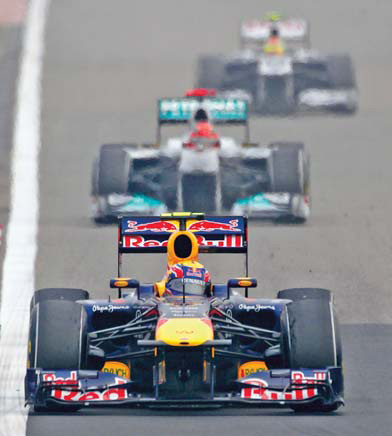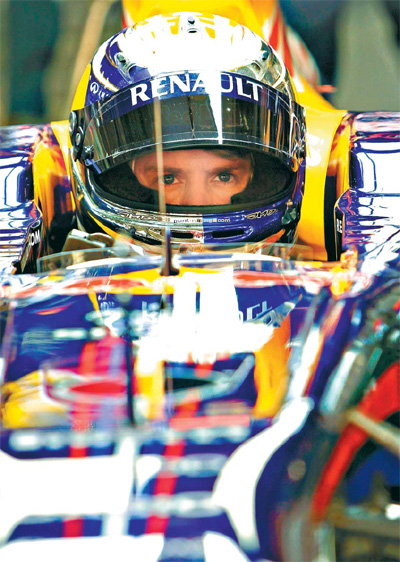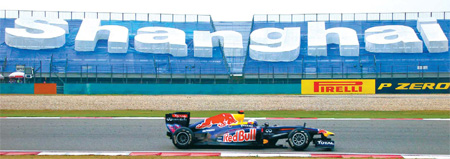Center
F1 drives into pole position
Updated: 2011-04-19 09:10
By Lei Lei (China Daily)
Sport revs up interest as supporters and sponsors embrace the fast life, reports Lei Lei in Shanghai.
The Chinese Grand Prix, part of the Formula One World Championship, has been an annual feature at the Shanghai International Circuit for eight years, and Yin Yue has been there on each occasion since his hometown won the right to stage the race in 2004. On Sunday he wore a Ferrari-red costume and a red wig.
 |
|
Red Bull's Mark Webber of Australia puts his car through its paces during a practice session for the Formula One Chinese Grand Prix at the Shanghai International Circuit on Friday. [David Gray / Reuters] |
"I will support Ferrari and Michael Schumacher forever, even though 'Schumi' is no longer on the team. I hope they both perform well here," Yin said before the race.
Schumacher, the seven-time world champion, came out of retirement last year and now drives for Mercedes GP. He finished eighth on Sunday and is ranked 11th in the drivers' table. His old team Ferrari is third in the constructors' table.
Yin, 23, a senior university student in Nanjing, made the trip home for the race to support his dream team and his favorite driver. He paid 1,180 yuan ($181) for his two-day ticket.
"I've loved to watch Formula One for such a long time, I can't remember when it started," he told China Daily. "I will continue to watch it for the rest of my life."
Yin is an example of a growing generation of young Formula One fans in China, a potentially strong market for the sport and its sponsors.
Attendance at the Shanghai race peaked at 270,000 spectators in 2005, dipped as low as 120,000 in 2009, but recovered to 163,000 this year, organizers said. The sport is growing domestically with an ever-increasing fan base and strong financial support.
"F1 is a super-great event with super-great influence. How to use and exploit such influence will be our top concern in the next seven years," said Jiang Lan, CEO and general manager of Shanghai Juss Event Management Co Ltd. The government-owned sports organizing company has a new seven-year contract for the race.
"It is a calling card for Shanghai that opens PR channels both for the country and the city, creates an ideal opportunity for the government and entrepreneurs to interact, develops local tourism, and promotes local brands on the international stage," Jiang said. "I'm very confident about the future of its development in China."
 |
|
Red Bull Formula One driver Sebastian Vettel of Germany is ready to go in the third practice session of the Chinese F1 Grand Prix at the Shanghai International Circuit on Saturday. [Aly Song / Reuters] |
Global and local
F1 has become a platform matched in scale only by the Olympic Games and the FIFA World Cup. Since the other two are one-off quadrennial events, F1's calendar that stretches almost throughout the year and visits 19 countries makes it both local and global.
Chen Yiping, deputy head of Shanghai Municipal Sports Bureau, said the race has brought Shanghai more than 10 billion yuan ($1.53 billion) in direct and indirect economic benefits over the past seven years. Figures were not yet available for this year.
During the 2010 season, 527 million television viewers watched at least 15 minutes of one Grand Prix race. China delivered 75 million of them, 14 percent of the total. All of the Formula One Grand Prix races are televised in China.
When the first seven-year contract expired last year, whether to even continue the event was a question. Attendance had weakened, and each year produced a deficit of nearly $30 million, according to some news reports. Organizers declined to release such figures.
However, Jiang's company signed another seven-year contract with the F1 boss, Federation Internationale de l'Automobile, in February and vowed to further promote the racing event in China.
"During the first seven years, we did not have enough experience to hold such a world top-level event. Staging a safe and successful race had turned into our priority by then," Jiang said. "But now we have accumulated enough experience on how to organize the race. Our focus should be switched to how to develop and make good use of it."
To fulfill the commitment, ticket prices for the event that began Thursday were reduced 40 percent, meaning the cheapest one-day ticket this year cost 80 yuan ($12). The cost of the best seat in the grandstand went from 3,980 yuan last year to 3,280 yuan this year, down 17.6 percent.
In addition, some policies were changed. Some spectators, for instance, can now visit the pit lane after the race.
"We cut the ticket price, but the boosted ticket sale can well make up the loss and we are expecting a higher box income than last year," Jiang said.
 |
|
A driver zips through a practice session on Friday for the Chinese F1 Grand Prix at the Shanghai International Circuit. The race course is in Jiading on Shanghai's western outskirts. [David Gray / Reuters] |
Specials

In the swim
Out of every 10 swimsuits in the world, seven are made in China.

Big spenders
Travelers spend more on shopping than food, hotels, other expenses

Rise in super rich
Rising property prices and a fast-growing economy have been the key drivers.